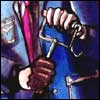
The economic recession is a harsh, dazing blow to many of us who rested comfortably on the status quo of financial security. 1.2 million jobs have been cut; Citigroup alone recently announced plans to lay off 50,000 employees, and the auto industry is tanking. The secure financial pillars of America have crashed to the ground, leaving millions stunned. The days of whipping out a credit card at the grocery store without consequence have ended, leaving people who used to make a decent living struggling to put food on the table.
While the news coverage was wonderfully dismal and pessimistic it didn't quite hit home until I became one of their depressing statistics. Me and all the ex Citigroup employees could have a pity party at Starbucks, although I'm not sure how we could afford it.
Why did I spend so much money on food last week?! I sat in shock that Friday afternoon, heart pounding, tears coming to my eyes, staring at my boss in disbelief and utter dismay. He looked intently at his desk, shame faced, and uncomfortably muttered, "With the economy the way it is now, I just can't afford any more than two full time people..."
Thoughts began racing through my head. Why did I spend so much money on food last week?! No more casual spending! Everything will have to be carefully calculated and considered before I extract my wallet from my purse. My Excel spread sheet containing my budget flashed before my eyes with negative numbers and my heart was filled with dread knowing that I had to make some serious cuts. Thank G‑d, my situation was not as dire as most, as I had a backup plan to study in Israel and savings to support myself. It's too scary to even begin to contemplate what would happen had I not had a contingency plan, or if I had a family to support.
So central is money to our survival that every day in the silent prayer we pray that G‑d bless us with abundance in terms of physical nourishment. On Yom Kippur, when we stand before G‑d as angels (who don't eat, mind you) praying to be sealed for life we also ask for sustenance. In ancient times, during the Yom Kippur service, the High Priest would enter the Holy of Holies chamber of the Temple, place the proper offering, step out and recite a short prayer. What does he ask for at this climactic spiritual moment? "…Let not Your people Israel depend on one another or on any other nation for its livelihood..."
And yet, though we need a livelihood to survive, this very same thing can lead us down a path of greed and a false sense of self-sufficiency. Such is the dichotomy of life. The thing that is most essential to survival can ultimately be that which corrupts us and leaves us devoid of true purpose and meaning.
In King Solomon's work Ecclesiastes he bewails, "havel havalim!" Futility of futilities! He expounds on the temporal nature of every endeavor and experience in this world. Everything that we labor in will pass on to someone else, every joy and pleasure we experience will eventually dissipate. We are hard-pressed to find anything that is lasting and eternal. Therefore, according to King Solomon, everything is futile.
These words flashed into my mind when I walked out of my boss's office that afternoon. The effort I invested in a career path and the creation of a sense of direction was taken away in a matter of seconds. All my feelings of self-created stability and permanence proved to be false, leaving me feeling as though the world was an unfriendly sea of crashing waves, letting me drown and giving me nothing sturdy to hold on to. I had mistakenly placed my self-concept, future, stability, and my path in the world in this job. It was all futile; I lost my job and all the things I had labored in. Futility of futilities!
King Solomon concludes his work with, "the sum of the matter, when all has been considered: fear G‑d and keep His commandments, for that is man's whole duty." When we are focused on spiritual pursuits the results of those labors are eternal and profoundly more pleasurable than anything purely physical or invested in things without permanence.
However, G‑d created a world in which my survival is dependent upon activities that in and of themselves are futile.
Our stability and direction should be placed in spiritual goalsRabbi Ephraim Twerski gave an interesting insight on this dichotomy. The Zohar says that we cannot make personal requests on Rosh Hashanah or Yom Kippur. So how could it be that the High Priest asked for sustenance? There is a Midrash that says that when Esau and Jacob were in the womb they fought over who would inherit this world and who would inherit the world to come. Jacob won the world to come and Esau won this world. Therefore, a descendent of Jacob doesn't have a right to the material pleasures of this world. If we do utilize materials of this world we are subject to attack from Esau for stealing his portion.
However, we need the tools of this world to survive. What is the solution? The key is its purpose. If we use this world for sake of the "next world," i.e. our spiritual pursuits, then Esau is unable to attack. Our request for sustenance on Yom Kippur is to enable us to focus on our ultimate spiritual purpose.
Our stability and direction should be placed in spiritual goals, with the necessities of this world as mere tools to help us achieve eternity.
In the Adon Olam, we say that G‑d is the "rock of my pain in time of my distress." In these economically difficult times we can be comforted that the One who gave abundance will surely provide again and know that our ultimate purpose lies far beyond our employment.
Everyone should have success in their path for spiritual greatness and be blessed with the physical sustenance to make that journey possible.






